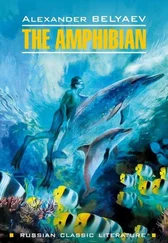What strikes fear into the earthly man is great fun to Ichthyander. Of course, waves can be dangerous for him too, but, like a fish, he knows their ways. There are many kinds of waves. Some will toss you up and down, up and down, others will turn you feet first before you know where you are. He also knows what goes on under the waves, and how waves disappear when the wind has died down. It’s the small waves that go first, then the big ones, but the dead swell stays for a long time afterwards. He delights in turning somersaults in the surf, though that isn’t without its danger either. Once an extra big wave overturned him and threw him against a rock unconscious. That would have been the end for an ordinary human being, but Ichthyander came to in the water, only slightly the worse for the experience.
There is no rain any longer; it has shifted, as has the storm, eastwards. The wind has veered too, blowing in warm blasts from the tropical north. Heralded by patches of blue sky torn in the clouds, the sun thrusts its rays through — seawards. In the south-east across a still menacingly black sky a rainbow throws its double arc. It’s an entirely different ocean that Ichthyander beholds now, no longer black with frothy fury, but a blue cheerful ocean, with emerald patches where sun rays have struck its breast.
The sun! In one moment it has changed everything-sky, ocean, shore, distant mountains-beyond recognition. And oh! How wonderful the air is after the storm. Ichthyander now gulps in the exhilarating sea-air, now breathes through his gills. No one knows better than Ichthyander how easy comes gill breathing after a storm has mixed sky with ocean, making the water a good deal richer in oxygen. No one, that is, among men.
But the numerous fish, and the sea-animals too, can appreciate this.
After a storm is over the sea depths, the crevices of the cliffs, the thickets of coral and sponge discharge their occupants; small fry show the way to the bigger fish and when it’s quite calm again, to soft weak jellyfish, transparent, weightless shrimps, delicate Porpita and various Ctenophora, including the most beautiful representative of the group, the Cestus Veneris.
A sunray strikes the water close to Ichthyander, turning it a bright green. The glitter of tiny air bubbles, the hiss of foam… Ichthyander’s playmates, the dolphins, are gambolling nearby, throwing him gay, mischievous glances. Their shiny black backs flash into view in the waves as they chase one another playfully, snorting. Ichthyander laughs and joins in the game. He feels as though this ocean and these dolphins, the sky and sun, were all created expressly for him to enjoy.
Inchthyander raises his head and screws up his eyes at the sun. It is in the west of the sky. Evening is near. But today he doesn’t feel like returning home early. He is going to rock on the waves until the first stars appear in the dark sky.
Yet lolling about soon tires him. And then, how could he forget all the small sea-creatures that are perishing that very moment. He treads water and looks in the direction of the distant shore. For the sand spit! That’s where his help is really needed. There where the ocean surf is playing havoc.
After a storm it hurls ashore heaps of sea-weeds and sea-creatures, all kinds of fishes, crabs, jellyfish, starfish, sometimes even an unwary dolphin. Jellyfish soon perish but some of the fish manage to wriggle their way back. So do most of the crabs; in fact they themselves leave the water for the beach to prey on storm victims. And it does his heart good to come to their rescue.
For hours he roams the beach in search of what it is not too late to rescue. It gives him real pleasure to see a fish, thrown into the water, splash with its tail and swim away. Or, still more, to see a fish at first floating lifeless side or belly up come at last to life. Picking up a large fish he will carry it seawards, pressing its wriggling body to his, laughing, as he talks to it in soothing accents. Of course, he would have eaten that very fish without any compunction had he been out in the ocean and hungry. But that’s an evil of necessity. Here, on the beach, he is the sea-dwellers’ patron, friend and saviour.
Usually Ichthyander returns home as he left-using the underwater current. But today he doesn’t feel like going underwater for long, so beautiful are the ocean and sky. He dives, swims underwater and breaks surface again, not unlike a sea-bird hunting fish.
The last rays of sun are gone. The yellow band is dwindling in the western horizon. Gloomy waves like grey shadows chase one another.
Compared with the warm water the air has a nip in it. It’s dark but Ichthyander feels safe; there’s nobody to attack him at this hour of quiet that divides day and night.
* * *
Here is what he needs-the southbound current flowing quite close to the ocean’s surface. The swell which is still felt makes the underwater river rise and fall a little as it traces its slow course from the hot north down to the cold south. A great deal lower — and in the opposite direction — runs a cold current. Inchthyander makes good use of both of them when his trips take him along the coast.
The warm current will carry him all the way home. He only has to keep awake so as not to overshoot the tunnelmouth as he once did. Stretching his arms behind his head and out to the side by way of exercise, and pulling his legs apart and slowly back together he lets himself be carried southwards. The warm water and slow movements have a soothing effect on him.
As Ichthyander looks up he sees a heaven dotted with stars as small as specks of dust. Those must be Noctilucae, rising to the ocean’s surface with their tiny lanterns lit up. Here and there in the darkness he sees bluish and pinkish luminous nebulae — tight clusters of minute luminous animals. Balls emitting mild greenish light sail slowly by. Shedding light quite close to Ichthyander is a jellyfish looking for all the world like a lamp under an elaborate shade of lace with a long fringe. The fringe stirs as in a light breeze at every movement of the jellyfish. In the shallows starfish have already put on lights. In the depths below the lights of big fish of prey cruise at speed. They chase one another, circle, die out and flicker up afresh.
Another shallow. The bizarre trunks and twigs of coral are illumined from within in blue, pink, green and white. Some corals flicker waningly, others gleam like red-hot metal.
On land at night you can see the stars, far off and tiny, sometimes the moon. Here there are thousands of stars, thousands of moons, thousands of small multicoloured suns all radiating soft delicate light. Night in the ocean is infinitely more beautiful than night on land.
To compare them Ichthyander breaks the surface again.
The air has become warmer. The dark blue heaven spread overhead is thickly studded with stars. A silver moon rides low above the horizon. A silver runs from it across the ocean.
From off the harbour comes a low prolonged hoot. That is the giant Horrocks, getting ready for the return voyage. Hey, but it’s late. Dawn is not far off. He has been gone nearly twenty-four hours. Father will definitely scold him.
Ichthyander heads for the tunnel, thrusts his hand through the iron bars, opens the grille and swims on in complete darkness. He is now in the lower, cold current that runs from the sea to the garden ponds.
A light knock on his shoulder wakes him up. He’s in the pool. Quickly he comes up; starts breathing through his lungs, taking in the air fragrant with familiar flower scents.
A few minutes later he’s fast asleep in bed-to please his father.
THE GIRL AND THE STRANGER
Once Ichthyander was out in the ocean after a storm.
Читать дальше
Конец ознакомительного отрывка
Купить книгу










